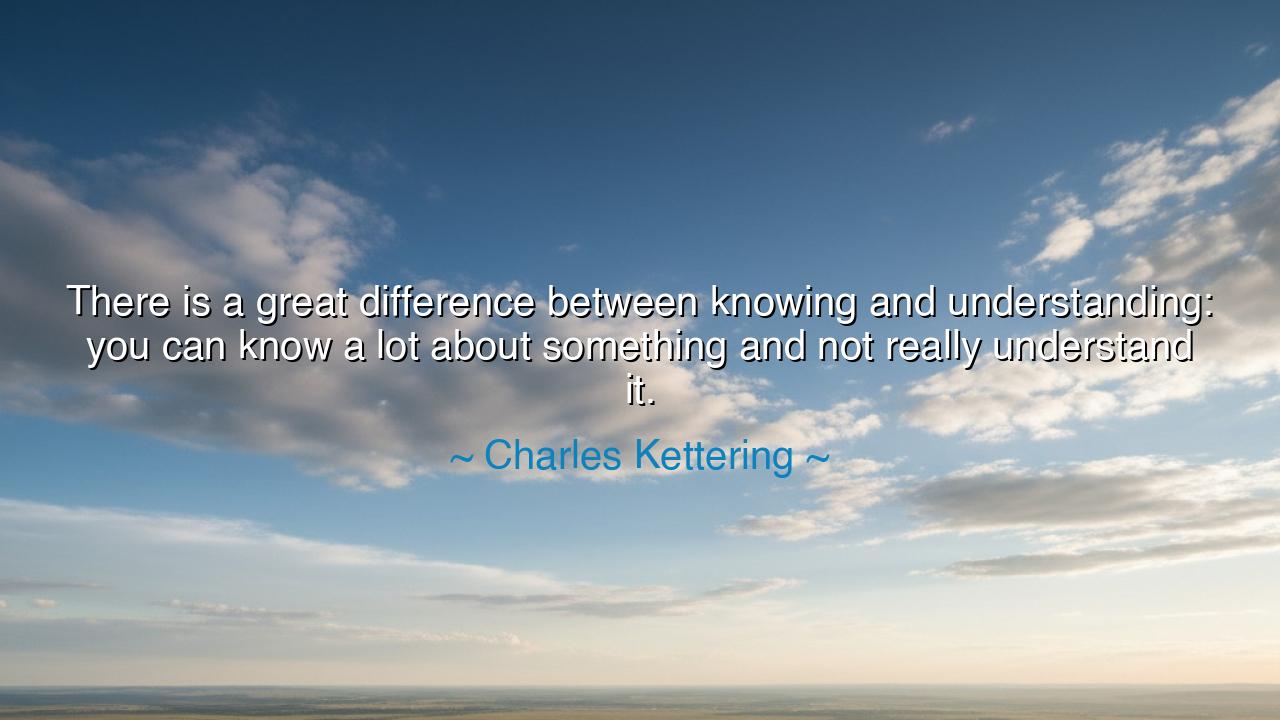
There is a great difference between knowing and understanding:
There is a great difference between knowing and understanding: you can know a lot about something and not really understand it.






"There is a great difference between knowing and understanding: you can know a lot about something and not really understand it." — these words by Charles Kettering, the American inventor and thinker, are like a torch held high in the fog of modern learning. They remind us that knowledge is but the surface of the ocean, while understanding is the depth that moves the tides. Many can recite facts, repeat doctrines, and accumulate data — yet still be blind to the essence that lies beneath. True understanding requires the union of mind and heart, of observation and reflection, of knowledge and wisdom forged in experience.
In the ancient academies of Greece, this truth was well known. Socrates, master of questioning, never claimed to know much — and yet he understood more than most, for he grasped the nature of ignorance. He believed that wisdom begins when one admits that he knows nothing. Those who merely know repeat the words of others; those who understand see through them, discern their meaning, and apply them to life. To know the name of virtue is easy — to understand virtue is to live it, to embody it in action.
Consider the story of the physician and the healer. The physician may know every part of the human body — each vein, each bone, each nerve — yet if he has never felt the suffering of another, if he cannot sense the trembling of the soul behind the sickness, he does not truly understand healing. Meanwhile, a humble nurse, with no great books to her name, may understand the heart of the wounded better than the scholar, because she has touched pain with compassion. It is experience, not memorization, that transforms knowledge into wisdom.
Charles Kettering himself lived by this creed. As an inventor at General Motors, he saw countless engineers who could calculate every mechanism but could not comprehend how machines served people. He once said that ideas are easy, but understanding the problem is what changes the world. His own work — from electric starters to refrigeration — was born not from academic theories alone, but from listening, observing, and connecting with human needs. To him, knowing how something works was not enough; one must understand why it should work, and for whom.
In truth, understanding is a sacred act. It demands patience, humility, and empathy. To understand the stars, one must look beyond their light and study their silence. To understand another person, one must go beyond their words and listen to the spaces between them. Knowledge fills the mind, but understanding opens the soul. One is the gathering of stones; the other, the building of a temple.
History is filled with those who knew much but understood little — empires that studied governance yet failed to understand justice, generals who mastered strategy but not humanity. And yet, history also honors those who combined knowledge with deep insight — the Buddha, who understood suffering beyond words; Leonardo da Vinci, who felt the heartbeat of nature in his inventions; Einstein, who saw beyond formulas to glimpse the harmony of the universe.
So let this be a lesson to the seekers of truth: Do not merely know — strive to understand. Read, but also reflect. Learn, but also live. Speak, but also listen. When you study, seek the living spirit within the lesson, not just its shell. When you meet another person, seek the heart behind the words. In time, you will find that understanding is the bridge between knowledge and wisdom, between the world of facts and the realm of meaning.
And if ever you forget, remember this: to know is to possess information; to understand is to be transformed by it. Knowledge fills your library — understanding fills your life.






AAdministratorAdministrator
Welcome, honored guests. Please leave a comment, we will respond soon